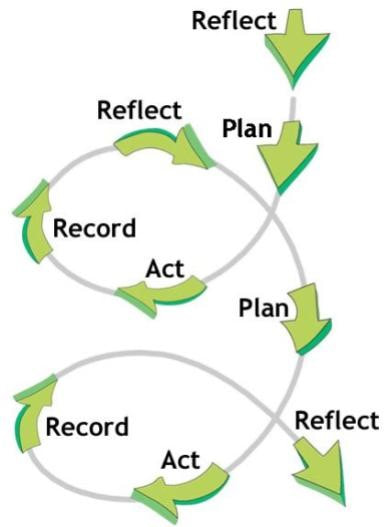Domain: Community Builder
Level-Specific Learning Statements
Aspiring
Applies collaborative skills to work productively with a team to achieve common goals.
Preparing
Participates in collaborative meetings to enhance student learning.
Emerging
With a mentor, participates in a community of practice to share evidence of effectiveness and progress towards curricular goals, plan curricular revisions, and discuss meeting student needs.
Developing
Shares innovative practices and revisions to instruction obtained from conducting action research and the use of emerging research within a community of practice.
Mastering
Coaches/Mentors aspiring, preparing, and/or emerging teachers in a community of practice on sharing evidence of effectiveness, monitoring progress towards curricular goals, making instructional revisions, and accessing services to meet student needs.
Leading
Provides leadership, training, mentoring, resources, and supports for teachers and others in the larger professional community on working in a community of practice, including sharing evidence of effectiveness, monitoring progress towards curricular goals, making instructional revisions, and accessing services to meet student needs.
Teachers who work together in a *Community of Practice work together collaboratively to achieve common goals. They share evidence of what is working for their students in their classrooms and the progress they are making towards accomplishing curricular goals. Teachers working in a *Community of Practice share new things they are trying and the revisions they make as they learn how their innovative practices are working in the classroom to meet the needs of students. Hopefully, teachers are able to find a *Community of Practice within their school community, however, *Communities of Practice extend to include professional learning networks a teacher may belong to through a university experience, social media group, professional development opportunities, association membership, or many other professional connections.
MTDS Glossary
Community of Practice
A community of practice is created when a group of people who “share a concern or passion for something they do and learn how to do it better as they interact regularly” (Wenger-Traynor, 2015, para 2). The community extends beyond networking or occasional conversations with members interacting together towards a common purpose and the goal of developing a shared set of knowledge, skills, and/or practices. They can be formal or informal structures, but in both there is the creation of relationships that connect people. Communities of practice are not limited to within building or district groups, but may expand connections between educators across boundaries, including across districts, regions, states, and/or countries.
Action Research
|
*Image Credit: McNiff & Whitehead, 2006
|
“a quest for knowledge about how to improve” - Ferrance, 2000, p. 2
When teachers engage in action research, they begin by asking themselves questions about their practice and their impact on their students, and possibly imagining what their ideal state would be, or what their vision is for themselves and their students. It is a self-reflective inquiry into their work with the goal of changing and improving their practice.
Teachers gather information within the context of their environment in order to identify an area of improvement or change they would like to make, plan for the implementation of their new strategies and methods of measuring their progress, and then observe themselves throughout the implementation, reflecting on their progress and gathering evidence to support their findings. The teacher then reflects on the process and makes revisions for the future. The process repeats over and over through cycles of self-assessment and adjustments to practice based on new understanding gained from the action research process. The process includes planning, taking action, observing, reflective, and then planning again. |
Emerging Research“It is quite obvious that emerging research covers the novelty dimension of frontier research” (ERC, 2013, p4) The research topic is considered to be emerging due to a very rapid growth or expansion in the number of research publications pertaining to the topic, which have resulted during a short interval of time (Cozzens, et al, 2010; Small, 2014). The research is getting a lot of likes...Its a hot topic! In addition to the “nearly universal agreement on two properties associated with emergence, novelty (or newness) and growth” (Small et al, 2014, p. 1451), the scientific impact of the research (Rotolo et al., 2015) determined by the number of citations is also a consideration in determining whether a research topic is considered to be emerging. |
Innovative Practices“Innovation is fearless. It is able to ignore what’s been done in the past in order to reimagine what education can be in the future.” (Will Gourley, TedEd Innovative Teacher) Innovative practices are new and original methodologies. Some innovative practices involve fundamental changes to school structures and traditional teaching practices. However, many times, innovative practices emerge from small changes teachers make to their current instruction in order to create new structures, processes, strategies, modalities, etc. to improve learning for students. When teachers are willing to leave their traditional practices in order to try new strategies, modalities, resources, etc. in order to meet the needs of their students they are using innovative practices. Implementing innovative practices involves a willingness to take a risk and accept potential failure. Innovative practices include the use of new technologies, the redesign of learning environments, and adoption of current educational trends in order to prepare students for the future. |
Missouri Teacher Development System July 2022
